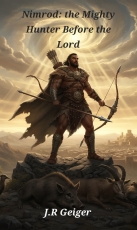
Book by: J.R. Geiger
Genre: Non-Fiction
History remembers Nimrod in fragments. He is known as a mighty hunter before the Lord. He is listed as the founder of great cities. His name echoes in ancient genealogies and world-spanning legends, yet when the great Tower of Babel rose in defiant arrogance, his name abruptly vanished from the scriptural record.
Why?
The Scriptures are relentlessly clear when kings fall into pride. Pharaoh is named and broken. Saul is rejected and undone. David, beloved of God, is rebuked in the full view of history. But Nimrod—whose immense strength and vision shaped the first true kingdom after the flood, founding Babel, Erech, Accad, and Calneh—is strikingly absent from the narrative of Babel’s judgment. The silence is not accidental.
The Speculative Truth
Let me be perfectly clear: the journey traced in these pages is speculation. The Bible gives us only the bare facts of Nimrod’s name and his founding of cities. It leaves a haunting blank space where his moral verdict should be. This book has sought to fill that silence, to explore the most logical and faithful conclusion for a king who simply disappeared.
The Legacy of Restraint
The hypothesis is this: Nimrod warned his people; he walked away from his own creation; he built anew in humility. He continued his God-given mission, founding the righteous northern kingdom of Nineveh, Rehoboth-Ir, Calah, and Resen. He chose obedience over ambition, restraint over tyranny. He became the lonely watchman on the bluff, the faithful intercessor who prayed while the world below built its stairway to folly. And when the divine judgment fractured the common language and scattered the nations, his people were spared—not by the height of brick or the thickness of walls, but by the covenant he upheld.
Nimrod did not disappear from history because he was condemned, but because he chose silence. He refused to be the rebel, and he refused to be the despot. Scripture honors this choice by leaving him in ambiguity. His true legacy is not rebellion, but restraint. Not pride, but prayer.
He was the hunter who tracked beasts, the explorer and builder who raised righteous cities, and the king whose greatest act of leadership was to kneel. When the unified world broke apart, he faded into legend—remembered only in whispers, his name etched into the geography of the earth but ghosted from the rebellion of Babel.
Nimrod’s story ends not with a fall, but with a lingering mystery: the mighty hunter who vanished from history, leaving behind the paradox of strength bound by humility, ambition tempered by obedience. His silence is his enduring monument—like the rainbow itself, a reminder that mercy, not pride, secures the future.
© Copyright 2026 J.R. Geiger. All rights reserved.
Regular reviews are a general comments about the work read. Provide comments on plot, character development, description, etc.
In-line reviews allow you to provide in-context comments to what you have read. You can comment on grammar, word usage, plot, characters, etc.
Nice conclusion to your tale. I like your summing up. It may be that there is more information on Nimrod in hidden scriptures etc that the vatican in particular keep secret in their vaults. The stories in the bible do their best to put together a logical creation tale from the fragmented sources available to the writers. Its teachings and parables are designed to encourage the best in humanity but are sometimes lost in translation. Good work my friend, this is as true a tale as any in the gospels and whose to say this is not exactly what happened.
Morag Higgins